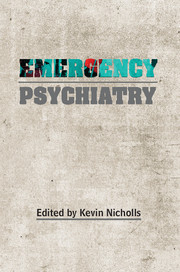Book contents
- Frontmatter
- Contents
- List of contributors
- Acknowledgements
- Preface
- 1 Assessment of suicide risk
- 2 Violence and aggression
- 3 Substance misuse emergencies
- 4 Alcohol and psychiatric emergencies
- 5 Acute psychosis
- 6 Acute side-effects of psychotropic medication
- 7 Emergencies in child and adolescent psychiatry
- 8 The psychiatric intensive care unit
- 9 Safeguarding
- 10 Emergency electroconvulsive therapy
- 11 Life-threatening medical emergencies in a mental health unit
- 12 Emergencies in intellectual disability psychiatry
- 13 Emergencies in older persons’ psychiatry
- 14 Perinatal psychiatric emergencies
- 15 Civilian and military psychological trauma
- 16 Emergencies in liaison psychiatry
- 17 Psychiatric emergencies in deaf people
- 18 Mental health law
- 19 Self-poisoning: aspects of assessment and initial care
- Index
11 - Life-threatening medical emergencies in a mental health unit
Published online by Cambridge University Press: 01 January 2018
- Frontmatter
- Contents
- List of contributors
- Acknowledgements
- Preface
- 1 Assessment of suicide risk
- 2 Violence and aggression
- 3 Substance misuse emergencies
- 4 Alcohol and psychiatric emergencies
- 5 Acute psychosis
- 6 Acute side-effects of psychotropic medication
- 7 Emergencies in child and adolescent psychiatry
- 8 The psychiatric intensive care unit
- 9 Safeguarding
- 10 Emergency electroconvulsive therapy
- 11 Life-threatening medical emergencies in a mental health unit
- 12 Emergencies in intellectual disability psychiatry
- 13 Emergencies in older persons’ psychiatry
- 14 Perinatal psychiatric emergencies
- 15 Civilian and military psychological trauma
- 16 Emergencies in liaison psychiatry
- 17 Psychiatric emergencies in deaf people
- 18 Mental health law
- 19 Self-poisoning: aspects of assessment and initial care
- Index
Summary
Life-threatening medical emergencies on mental health units are mistakenly perceived as infrequent. In a 2-year study examining the frequency of callouts of a US medical emergency team in a mental health unit, Cheung et al (2012) recorded an emergency response rate of 14.2 per 1000 admissions. This compared with 14.7 per 1000 admissions at the co-located medical hospital. Although this result might not be generalisable, it raises a clear question: why should a similar emergency medical need exist among mental health in-patients and patients of a medical hospital?
One explanation is that medical comorbidity is common for people with acute mental health problems. Lyketsos et al (2002) reported that 15% of patients in adult psychiatric hospitals had serious medical comorbidity on admission. Similarly, in a study of elderly patients admitted to a psychiatric emergency unit, 19% of the patients presented with a previously unrecognised medical disorder either causing or contributing to the psychiatric symptoms and 93% of all the patients had at least one chronic medical disorder (Woo, 2011). For those with intellectual disabilities, the risks of some specific medical illnesses are greater. For instance, the prevalence of epilepsy in this patient group is up to 30% (Wilson & Haire, 1990). In the elderly, falls have the potential for immediate life-threatening complications. On the basis of an analysis of falls in UK mental health units, an average rate of 2.1 falls per 1000 bed days is seen, with this rising to 13–25 falls per 1000 bed days in units providing exclusive care for the elderly (National Reporting and Learning Service, 2007). This included 4 deaths from falls and 85 cases of severe harm (e.g. brain damage or fractured neck of femur.)
Unfortunately, medical emergencies are rarely easy to predict. The acute medical complications of problems such as anorexia (Sharp & Freeman, 1993), dementia (Mukadam & Sampson, 2011), substance misuse and acute intoxication, although well recognised, are hard to predict by way of individual risk. The importance of early recognition of a deteriorating patient presenting with progressively worsening physiological derangement is regarded as crucial in avoiding a cardiorespiratory arrest scenario (National Confidential Inquiry into Patient Outcomes and Death, 2012).
- Type
- Chapter
- Information
- Emergency Psychiatry , pp. 185 - 216Publisher: Royal College of PsychiatristsPrint publication year: 2015



